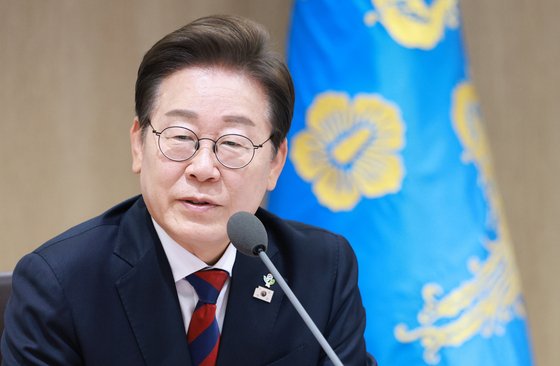![President Lee Jae-myung speaks during a Cabinet meeting at the presidential office in Yongsan, central Seoul, on June 5. [JOINT PRESS CORPS]](https://koreajoongangdaily.joins.com/data/photo/2025/06/06/0bc8a8d3-3e5f-44cf-9bc0-80a7a9259e95.jpg)
President Lee Jae-myung speaks during a Cabinet meeting at the presidential office in Yongsan, central Seoul, on June 5. [JOINT PRESS CORPS]
Korea’s leading conglomerate holding companies are closely watching whether President Lee Jae-myung will follow through on his campaign pledge to mandate the cancellation of treasury stock.
One such top-10 group holding firm is especially vigilant as it reviews a plan to sell part of its treasury shares to secure investment capital.
“We’re accelerating plans to dispose of some treasury shares,” a group representative said. “But at the same time, we’re also considering retiring a portion of them to return value to shareholders.”
Shares of major holding companies have surged recently amid optimism surrounding corporate governance reform.
Investors are betting that these firms will benefit if the new administration makes good on its pledges, such as revising the Commercial Act and requiring companies to retire treasury stock.

Hanwha Corp.— the de facto holding company of Hanwha Group —jumped from 50,300 won ($37) per share on May 22 to 90,700 won on Thursday, a rise of 80.3 percent in just two weeks.
On President Lee’s first day in office on Wednesday, the stock surged nearly 21 percent from the previous session.
Other holding firms also rallied: SK rose 35.9 percent; Doosan 33.6 percent; Lotte Corp. 22.6 percent; CJ 21.2 percent and LS by 19.7 percent.
These companies have traditionally traded at low price-to-book ratios, often attributed to cross-listed subsidiaries, governance issues tied to controlling families and a reluctance to cancel treasury stock.
But with the Lee administration expected to address these structural problems, expectations for a revaluation are rising.
Major conglomerate holding firms hold significant amounts of treasury stock: Lotte Corp. owns 32.5 percent of its shares; SK 24.8 percent; Doosan 18.2 percent and LS 15.1 percent.
![The Hanwha logo is shown at Hanwha Group's offices in Jung District, central Seoul. [NEWS1]](https://koreajoongangdaily.joins.com/data/photo/2025/06/06/097457a9-3346-4ff9-95b4-4df5e961d9b1.jpg)
The Hanwha logo is shown at Hanwha Group’s offices in Jung District, central Seoul. [NEWS1]
Despite the stock rally, not all companies are celebrating. Hanwha Chairman Kim Seung-youn recently transferred an 11.32 percent stake in the holding firm to his three sons. The gift tax, however, will be based on the average share price from April to June, which now reflects the recent surge — nearly doubling the expected tax burden.
Other holding firms hoping to use treasury stock to shore up finances are also caught off guard.
“There’s no clear policy direction yet, so we’re in a wait-and-see mode,” said a holdings company representative who asked for anonymity.
“The corporate bond market is frozen, and we’re relying on options like using treasury stock as loan collateral. If full cancellation becomes mandatory, it’ll put a heavy strain on us.”
A representative at a different company commented, “In reality, share cancellation is often just a short-term event in the market. What really matters is improving long-term corporate value.”
![A screen in Hana Bank's trading room in central Seoul shows the Kospi surpassing the 2,800 mark on June 5. [NEWS1]](https://koreajoongangdaily.joins.com/data/photo/2025/06/06/42a76332-7fd8-49ef-8056-3b1169776937.jpg)
A screen in Hana Bank’s trading room in central Seoul shows the Kospi surpassing the 2,800 mark on June 5. [NEWS1]
Companies are also concerned about losing a critical defense tool against hostile takeovers, particularly from activist investors.
Unlike many other countries, Korea does not permit protective measures like poison pills — which give existing shareholders the right to purchase additional shares at a discounted price — or dual-class shares.
Though treasury shares don’t carry voting rights, if transferred to a third party, those rights can be exercised — essentially providing companies with friendly “white knight” investors.
Recent cases highlight this strategy. LS Group issued 65 billion won worth of exchangeable bonds to Korean Air, owned by Hanjin Group, giving Korean Air the right to later acquire LS treasury shares.
Officially, the move was described as a “strategic alliance,” but analysts say it was also aimed at cementing ties ahead of potential management disputes.
Hanjin KAL, meanwhile, donated treasury stock to its employee welfare fund to strengthen friendly stakes.
A report by law firm Shin & Kim warned that if a policy mandating the cancellation of treasury stock becomes law, “it could make it difficult to acquire treasury shares for defensive purposes or transfer them to allies.”
“It could also complicate financing methods such as issuing exchangeable bonds backed by treasury shares, ultimately reshaping both ownership and financial structures of corporations,” the firm said.
Translated from the JoongAng Ilbo using generative AI and edited by Korea JoongAng Daily staff.
BY CHOI SUN-EUL [[email protected]

